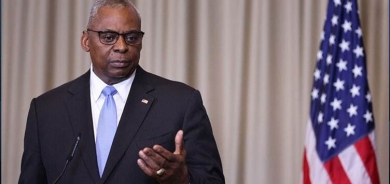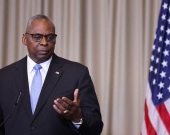EU: Neighboring countries should respect Iraqi sovereignty

The comments came from Dominic Porter, deputy head of division Arabian Peninsula, Iran and Iraq for EEAS.
Porter gave a general overview of the situation in Iraq and relations with the EU.
Regarding ongoing preparations for the first Arab League Summit in Baghdad since 1990 he said: “This is sign for the ending of the isolation of Iraq and regaining its own sovereignty as a member of the Arab League.
"We have to note that this time Turkey and Iran were not invited even as observers. We consider this as success and as proof that Iraq wants to be independent.”
Porter underlined that Iraq is one of the countries in the world, which knows better than anyone else, that “neighbors cannot solve the internal problems of a country, but can only worsen them”.
Porter referred especially to the strategy of Iran, whereby it tries to influence Iraq's internal politic by using Iraqi Shi’a Muslims. This potential influence can have a very negative impact on peace and stability in the country, according to Porter.
The EEAS official mentioned several of Iraq's internal problems which have still not been solved, for example the revision of the constitution, the disputed areas and the sharing of oil revenues.
“The EU hopes that Iraq will organize a national conference to address and solve these important issues,” said Porter.
Porter analyzed the current state of relations between the EU and Iraq, pointing out that the EU has important geopolitical and strategic interests in Iraq, especially with regard to the southern energy corridor.
"We are preparing to sign an EU partnership and association agreement with Baghdad, which will include details of our cooperation areas."
At the same time, the EU would like to promote democracy and European values in Iraq.
“We still have serious concerns about the human rights situation in Iraq, especially regarding the increasing use of the death penalty, the precarious minorities situation and women right," said Porter.
He expressed hope that Iraq will soon establish a national human rights commission to deal with these problems.
Porter also cited the last Gallup survey on public satisfaction of living standards and governance in Iraq. While in 2010, 50 percent of the Iraqi population was satisfied with life in Iraq, in 2011 only 32 percent of citizens supported the way the country was run, with 64 percent dissatisfied.
“It's a clear message to the government of Iraq that people are fed up with political infighting."
The meeting was attended by Members of the European Parliament, European officials, the Head of the Kurdistan Regional Government Mission to the EU Carlos Kurdi Gravi and Kurdish and Iraqi diplomats.
Jwan Hasan Khioka, the chargé d’affaires of the Iraq Embassy in Brussels, said Baghdad will organize a national conference in April 2012 to discuss the long standing pending issues among the political groups.
Khioka called for a stronger presence of the EU in Iraq and more active involvement and support in different areas, including in human rights.
She added that Iraq is a sovereign independent country and keen to build friendly relations with all countries - including with its neighbors - based on mutual respect and national interests. Khioka briefed the meeting about the Arab summit taking place in Baghdad.
A delegation from the European Parliament is expected to visit Iraq before the end of 2012.
The EEAS acts as a foreign ministry and diplomatic corps for the EU. The body implements the EU's Common Foreign and Security Policy and other areas of the EU's external representation.
AKnews














